Wolfram Function Repository
Instant-use add-on functions for the Wolfram Language
Function Repository Resource:
Find a path that goes from one expression to another with a sequence of replacements
ResourceFunction["FindEquationalPath"][theorem, axioms] finds a replacement path from the left-hand side of a theorem to its right-hand side using replacements specified by axioms. | |
ResourceFunction["FindEquationalPath"][proof] find a path for the precomputed ProofObject proof. | |
ResourceFunction["FindEquationalPath"][…, hypothesis] specify an explicit hypothesis lemma from the underlying ProofObject to return a path for. | |
ResourceFunction["FindEquationalPath"][…,hypothesis,conclusion] specify an explicit conclusion lemma from the underlying ProofObject to be used in path construction. | |
ResourceFunction["FindEquationalPath"][…,prop] returns a specified property prop of a replacement path. |
| "ProofObject" | the corresponding ProofObject |
| "Path" | a list of expressions comprising a found path (default) |
| "Justification" | a list of axioms used in each subsequent step of a path together with its orientation and position |
| "Rewrites" | a list of rewriting functions that reproduce a path |
| "RewritesTest" | test rewriting functions to successfully reproduce a path |
| "Rules" | axiom rules used at each step |
| "Bindings" | variable bindings for the rewrites |
| "Substitutions" | variable bindings substituted into rules |
| All | all of the above as an association |
Find a replacement path given a set of equations:
| In[1]:= |
| Out[1]= |
Find a replacement path using universally quantified equations:
| In[2]:= | ![ResourceFunction["FindEquationalPath"][
ForAll[{x, y}, plus[x, plus[y, 0]] == plus[x, plus[0, y]]], {ForAll[x, plus[x, 0] == x], ForAll[x, plus[x, neg[x]] == 0], ForAll[{x, y, z}, plus[plus[x, y], z] == plus[x, plus[y, z]]]}]](https://www.wolframcloud.com/obj/resourcesystem/images/4ed/4edacf77-2fd1-4637-8b86-b025f3d037d7/696dc0b10fc61479.png) |
| Out[2]= |
Find a much more complicated path:
| In[3]:= | ![ResourceFunction["FindEquationalPath"][
ForAll[{a, b}, or[not[or[not[a], b]], not[or[not[a], not[b]]]] == a], {ForAll[{a, b}, and[a, b] == and[b, a]], ForAll[{a, b}, or[a, b] == or[b, a]], ForAll[{a, b}, and[a, or[b, not[b]]] == a], ForAll[{a, b}, or[a, and[b, not[b]]] == a], ForAll[{a, b, c}, and[a, or[b, c]] == or[and[a, b], and[a, c]]], ForAll[{a, b, c}, or[a, and[b, c]] == and[or[a, b], or[a, c]]]}] // Short](https://www.wolframcloud.com/obj/resourcesystem/images/4ed/4edacf77-2fd1-4637-8b86-b025f3d037d7/392e96b1580fdabe.png) |
| Out[3]= |
Use names from the AxiomaticTheory for a list of axioms and its notable theorems:
| In[4]:= |
| Out[4]= |  |
Specify a custom theorem using AxiomaticTheory axioms:
| In[5]:= |
| Out[5]= |
Use a ProofObject to find a replacement path:
| In[6]:= |
| Out[6]= |
| In[7]:= |
| Out[7]= |  |
Specify a lemma or a different hypothesis from a proof to construct a path for:
| In[8]:= |
| Out[8]= |
| In[9]:= |
| Out[9]= |
Find a replacement path in a string substitution system:
| In[10]:= |
| Out[10]= |
| In[11]:= |
| Out[11]= |
Find a replacement path in a Wolfram model system:
| In[12]:= |
| Out[12]= |
| In[13]:= | ![ResourceFunction["WolframModelPlot"][#, VertexLabels -> Automatic] & /@
Reverse[
First /@ Gather[Sort /@ (List /@ ResourceFunction["FindEquationalPath"][
proof] /. {CircleMinus | CirclePlus | CircleTimes -> List, CircleDot -> Sequence})]
]](https://www.wolframcloud.com/obj/resourcesystem/images/4ed/4edacf77-2fd1-4637-8b86-b025f3d037d7/12999c1e5b4ba5dc.png) |
| Out[13]= |  |
Reproduce the replacement path using rewriting functions:
| In[14]:= |
| In[15]:= |
| Out[15]= |  |
Return all properties of the path:
| In[16]:= |
| Out[16]= | 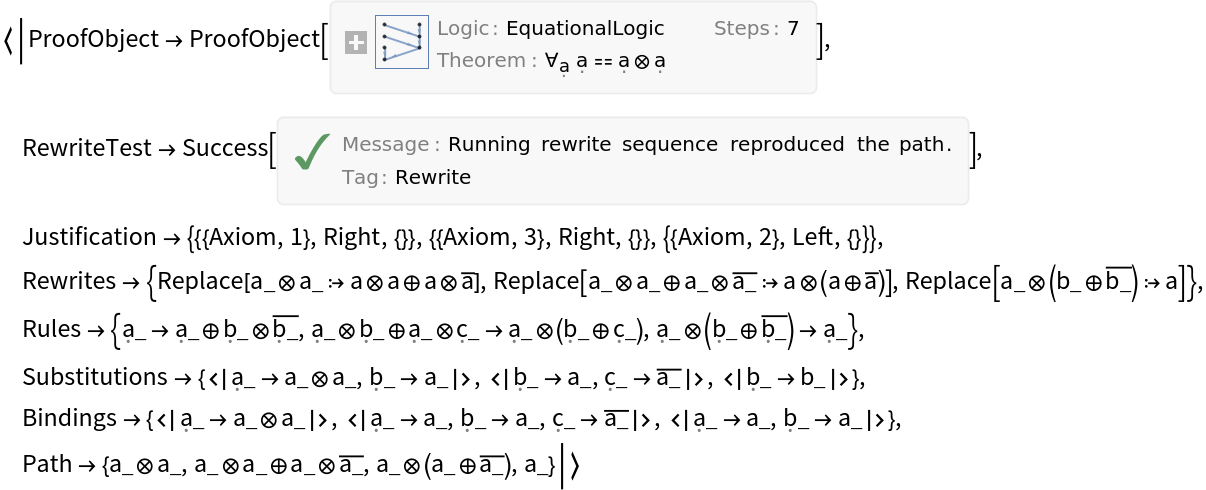 |
"Justification" is a list of axioms used in each subsequent step of a path together with its orientation and position:
| In[17]:= |
| Out[17]= |
"Rewrites" is a list of functions for ComposeList to reproduce the path:
| In[18]:= |
| Out[18]= |
| In[19]:= |
| Out[19]= |
"Rules" is a list of oriented lemma equations used at each step:
| In[20]:= |
| Out[20]= |
"Substitutions" is a list of additional variable replacements necessary to produce each intermediate term:
| In[21]:= |
| Out[21]= |
"Bindings" is a list of variable bindings of each rewriting step:
| In[22]:= |
| Out[22]= |
Reverse a path:
| In[23]:= |
| Out[23]= |
Treat lemmas as axioms by terminating path unrolling and shorten the path:
| In[24]:= |
| Out[24]= |  |
| In[25]:= |
| Out[25]= |
Simplification of path is taking place by cutting path segments between identical elements:
| In[26]:= |
| In[27]:= |
| In[28]:= |
| In[29]:= |
| In[30]:= | ![ListStepPlot[
MapAt[Callout[#, path[[62 + 16]], {{{90, 400}, Above}}, LeaderSize -> 150, LabelVisibility -> All] &, {3, 1}]@
MapAt[Callout[#, path[[62]], {{{50, 300}, Above}}, LeaderSize -> 100, LabelVisibility -> All] &, {2, 1}]@
Insert[#, #[[3, 1]], {2, -1}] &@Insert[#, #[[2, 1]], {1, -1}] &@
TakeList[MapIndexed[Append[#2, #1] &, Catenate[seqs]], Length /@ seqs], PlotStyle -> {RGBColor[0.24, 0.6, 0.8], Red, RGBColor[0.24, 0.6, 0.8]
}]](https://www.wolframcloud.com/obj/resourcesystem/images/4ed/4edacf77-2fd1-4637-8b86-b025f3d037d7/52412916830e7412.png) |
| Out[30]= | 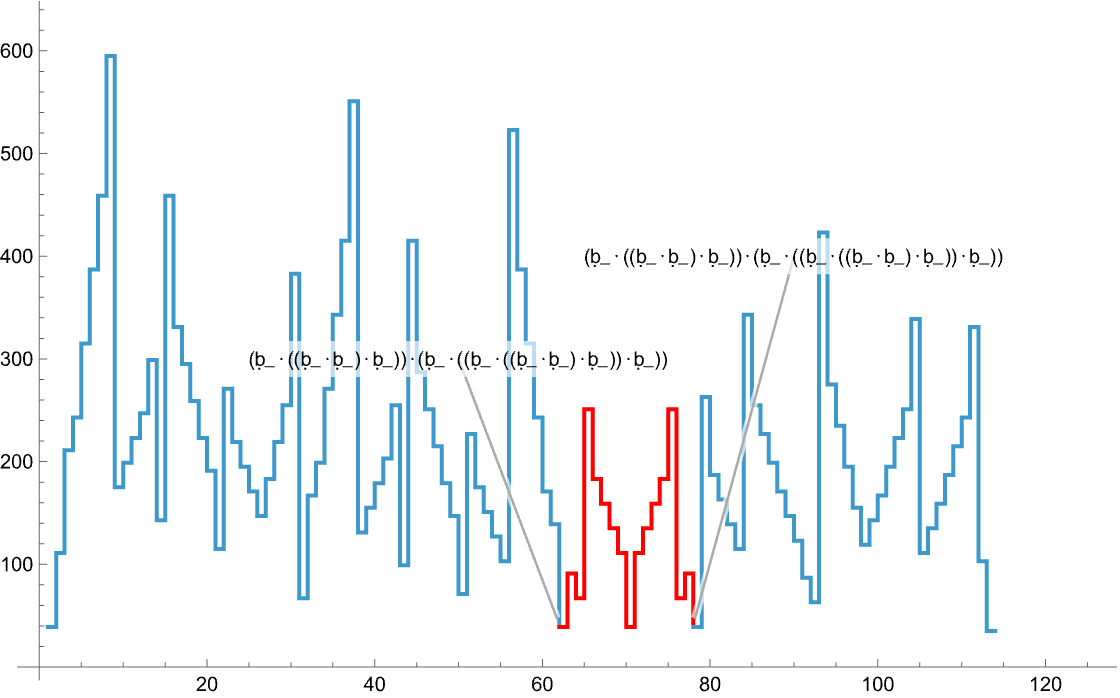 |
Canonicalize variable names:
| In[31]:= |
| Out[31]= |  |
Find a replacement path for a well known syllogism by specifying an existentially quantified goal:
| In[32]:= |
| Out[32]= | 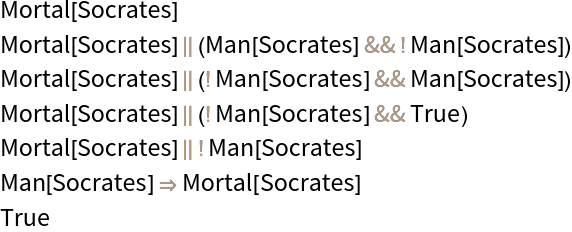 |
Test Boolean theorems:
| In[33]:= | ![AssociationMap[
ResourceFunction["FindEquationalPath"][#, "BooleanAxioms", All][
"RewriteTest"] & /@ AxiomaticTheory["BooleanAxioms", "NotableTheorems"][#] &, Keys@AxiomaticTheory["BooleanAxioms", "NotableTheorems"]] // Short](https://www.wolframcloud.com/obj/resourcesystem/images/4ed/4edacf77-2fd1-4637-8b86-b025f3d037d7/1c34a9ca9b8fed65.png) |
| Out[33]= |  |
An example from A New Kind of Science (p. 775):
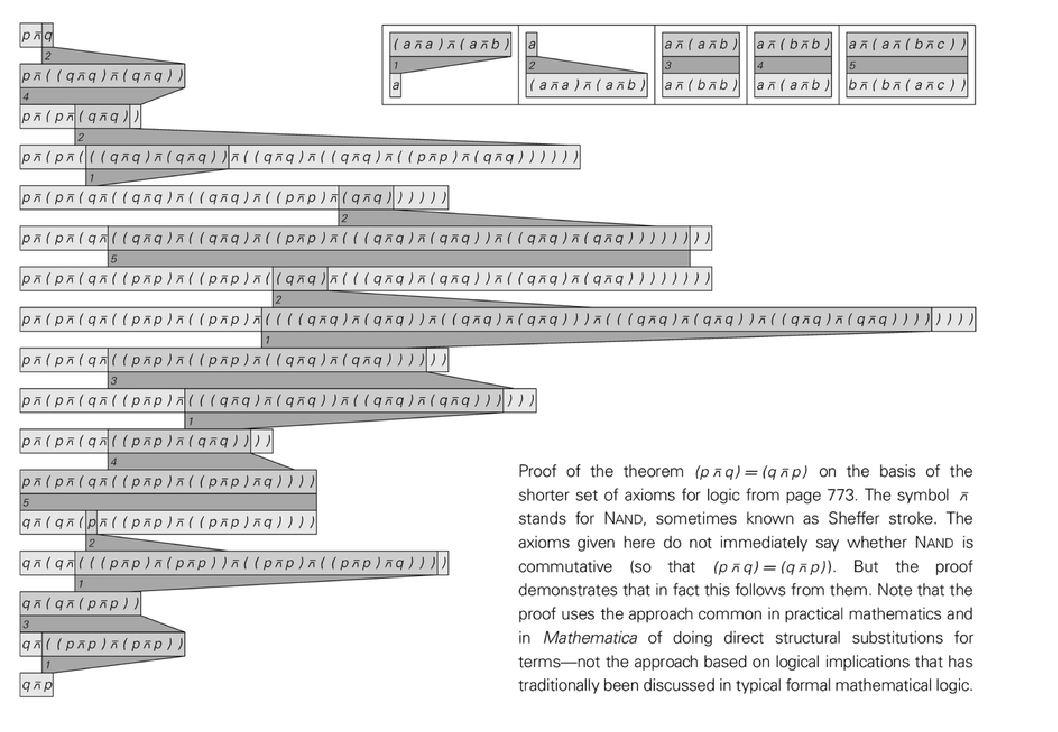
It is two steps shorter, but it uses a reverse of one axiom:
| In[34]:= | ![Column[Style[#, 8] & /@ ResourceFunction["FindEquationalPath"][
ForAll[{p, q}, p\[CenterDot]q == q\[CenterDot]p], {\!\(
\*SubscriptBox[\(\[ForAll]\), \(\[FormalA]\)]\(\((\[FormalA]\[CenterDot]\[FormalA])\)\[CenterDot]\((\[FormalA]\[CenterDot]\[FormalA])\)\)\) \[Implies] \[FormalA], \!\(
\*SubscriptBox[\(\[ForAll]\), \({\[FormalA], \[FormalB]}\)]\(\[FormalA] == \((\[FormalA]\[CenterDot]\[FormalA])\)\[CenterDot]\((\[FormalA]\[CenterDot]\[FormalB])\)\)\), \!\(
\*SubscriptBox[\(\[ForAll]\), \({\[FormalA], \[FormalB]}\)]\(\[FormalA]\[CenterDot]\((\[FormalA]\[CenterDot]\[FormalB])\) == \[FormalA]\[CenterDot]\((\[FormalB]\[CenterDot]\[FormalB])\)\)\), \!\(
\*SubscriptBox[\(\[ForAll]\), \({\[FormalA], \[FormalB], \[FormalC]}\)]\(\((\[FormalA]\[CenterDot]\((\[FormalA]\[CenterDot]\((\[FormalB]\[CenterDot]\[FormalC])\))\))\) == \((\[FormalB]\[CenterDot]\((\[FormalB]\[CenterDot]\((\[FormalA]\[CenterDot]\[FormalC])\))\))\)\)\)}, "Path"] /. Verbatim[Pattern][x_, _] :> x, Frame -> All]](https://www.wolframcloud.com/obj/resourcesystem/images/4ed/4edacf77-2fd1-4637-8b86-b025f3d037d7/13a13c07544e381d.png) |
| Out[34]= |  |
Prove the existential version of the same theorem using a proof by refutation:
| In[35]:= | ![ResourceFunction["FindEquationalPath"][
Exists[{p, q}, p\[CenterDot]q == q\[CenterDot]p], {\!\(
\*SubscriptBox[\(\[ForAll]\), \(\[FormalA]\)]\(\((\[FormalA]\[CenterDot]\[FormalA])\)\[CenterDot]\((\[FormalA]\[CenterDot]\[FormalA])\)\)\) \[Implies] \[FormalA], \!\(
\*SubscriptBox[\(\[ForAll]\), \({\[FormalA], \[FormalB]}\)]\(\[FormalA] == \((\[FormalA]\[CenterDot]\[FormalA])\)\[CenterDot]\((\[FormalA]\[CenterDot]\[FormalB])\)\)\), \!\(
\*SubscriptBox[\(\[ForAll]\), \({\[FormalA], \[FormalB]}\)]\(\[FormalA]\[CenterDot]\((\[FormalA]\[CenterDot]\[FormalB])\) == \[FormalA]\[CenterDot]\((\[FormalB]\[CenterDot]\[FormalB])\)\)\), \!\(
\*SubscriptBox[\(\[ForAll]\), \({\[FormalA], \[FormalB], \[FormalC]}\)]\(\((\[FormalA]\[CenterDot]\((\[FormalA]\[CenterDot]\((\[FormalB]\[CenterDot]\[FormalC])\))\))\) == \((\[FormalB]\[CenterDot]\((\[FormalB]\[CenterDot]\((\[FormalA]\[CenterDot]\[FormalC])\))\))\)\)\)}]](https://www.wolframcloud.com/obj/resourcesystem/images/4ed/4edacf77-2fd1-4637-8b86-b025f3d037d7/69e12f573120f266.png) |
| Out[35]= |
Visualize a path with maximum extra details. Begin by defining visualization and utility functions:
| In[36]:= |
| In[37]:= | ![Options[highlightExpression] = {"LeftLemmaFrame" -> {Background -> RGBColor[1, 0.85, 0.85]}, "RightLemmaFrame" -> {Background -> RGBColor[0.88, 1, 0.88]}, "InputFrame" -> {Background -> RGBColor[0.83, 0.88, 0.95]}, "OutputFrame" -> {Background -> RGBColor[0.67, 0.76, 0.91], FrameMargins -> 0}, "InputStyle" -> {}, "OutputStyle" -> {}};
highlightExpression[expr_, pos1_, pos2_, OptionsPattern[]] :=
If[
OrderedQ[{pos1, pos2}, LexicographicOrder], Reverse, #& ][
Composition[
If[pos2 === None, Identity,
MapAt[If[pos2 === {}, Framed, FramedParens][
Style[#,
OptionValue["OutputStyle"]],
OptionValue["OutputFrame"], FrameStyle -> None, ContentPadding -> False]& , {pos2}]],
If[pos1 === None, #& ,
MapAt[If[pos1 === {}, Framed, FramedParens][
Style[#,
OptionValue["InputStyle"]],
OptionValue["InputFrame"], FrameMargins -> 1, FrameStyle -> None, ContentPadding -> False]& , {pos1}]]]]@expr](https://www.wolframcloud.com/obj/resourcesystem/images/4ed/4edacf77-2fd1-4637-8b86-b025f3d037d7/308f2c11e17c8232.png) |
| In[38]:= |
| In[39]:= | ![Options[visualizeRow] = Join[{"ShowTheorem" -> False, "ShowLemmas" -> False, "ShowBindings" -> False, "ShowSubstitutions" -> False, "LemmaStyle" -> {}, "LemmaFrame" -> {Background -> GrayLevel[0.9], FrameStyle -> GrayLevel[0.7]}},
Options[highlightExpression]];
visualizeRow[opts : OptionsPattern[]] := With[{showTheoremQ = TrueQ[
OptionValue["ShowTheorem"]], showLemmasQ = TrueQ[
OptionValue["ShowLemmas"]], showSubstitutions = If[
TrueQ[
OptionValue["ShowSubstitutions"]], Row[#, ","]& , Nothing& ], showBindings = If[
TrueQ[
OptionValue["ShowBindings"]], Row[
MapApply[Row[{#, ":", #2}]& , #], ","]& , Nothing& ], showLemmaLabel = Replace[{
Pattern[kind,
Blank[]],
Pattern[k,
Blank[]]} :> Replace[
StringTake[kind, 1], "C" -> "B"] <> ToString[k]]},
Replace[{{
Pattern[tooltip,
Blank[]], {
Pattern[lemma,
Blank[]],
Blank[], None}, None,
BlankNullSequence[]} :> {
Tooltip[
Framed[
Style[
If[showTheoremQ, tooltip,
showLemmaLabel[lemma]],
OptionValue["LemmaStyle"]],
OptionValue["LemmaFrame"]],
If[showTheoremQ,
showLemmaLabel[lemma], tooltip]], "", ""}, {
Pattern[tooltip,
Blank[]], {None,
Blank[],
Pattern[pos,
Blank[]]},
Pattern[expr,
Blank[]], None,
Blank[],
Pattern[subst,
Blank[]]} :> {
If[
TrueQ[
OptionValue["ShowSubstitutions"]],
showSubstitutions[subst], SpanFromAbove],
highlightExpression[expr, None, pos,
FilterRules[{opts},
Options[highlightExpression]]], SpanFromAbove}, {
Pattern[tooltip,
Blank[]], {
Pattern[lemma,
Blank[]], None, None},
Pattern[expr,
Blank[]],
Pattern[prevPos,
Blank[]],
Pattern[bind,
Blank[]],
BlankNullSequence[]} :> {
Tooltip[
Framed[
Style[
If[showTheoremQ, tooltip,
showLemmaLabel[lemma]],
OptionValue["LemmaStyle"]],
OptionValue["LemmaFrame"]],
If[showTheoremQ,
showLemmaLabel[lemma], tooltip]],
highlightExpression[expr, prevPos, None,
FilterRules[{opts},
Options[highlightExpression]]],
showBindings[bind]}, {
Pattern[tooltip,
Blank[]], {
Pattern[lemma,
Blank[]],
Pattern[dir,
Blank[]],
Pattern[pos,
Blank[]]},
Pattern[expr,
Blank[]],
Pattern[prevPos,
Blank[]],
Pattern[bind,
Blank[]],
BlankNullSequence[]} :> {
Row[{"=",
Tooltip[
Framed[
If[showLemmasQ,
MapApply[Rule,
Replace[dir, {Left -> (Reverse[#, {2}]& ), Right -> Identity}][
tooltip]], showLemmaLabel[lemma] <> Replace[
dir, {Left -> "\[LeftArrow]", Right -> "->"}]],
Replace[dir, {Left -> OptionValue["LeftLemmaFrame"], Right -> OptionValue["RightLemmaFrame"]}], FrameStyle -> None],
If[showLemmasQ,
showLemmaLabel[lemma], tooltip]]}],
highlightExpression[expr, prevPos, pos,
FilterRules[{opts},
Options[highlightExpression]]],
showBindings[bind]}, {
Pattern[tooltip,
Blank[]], None,
Pattern[expr,
Blank[]],
Pattern[prevPos,
Blank[]],
BlankNullSequence[]} :> {SpanFromAbove,
highlightExpression[expr, None, prevPos,
FilterRules[{opts},
Options[highlightExpression]]], SpanFromAbove}}]];](https://www.wolframcloud.com/obj/resourcesystem/images/4ed/4edacf77-2fd1-4637-8b86-b025f3d037d7/5d494973f66609f1.png) |
| In[40]:= | ![VisualizePath // ClearAll
Options[VisualizePath] = Join[{"DoubleRows" -> False, "ShowOperators" -> True, "ShowLemmas" -> False, "Grid" -> {FrameStyle -> GrayLevel[0.7], Dividers -> {{True}, {{True}}}, Spacings -> {0.5, 0.6}}},
Options[visualizeRow]];
VisualizePath[po_ProofObject, lemmas_, target_, opts : OptionsPattern[]] := VisualizePath[
ResourceFunction["FindEquationalPath"][po, target, All, "TerminalLemmas" -> lemmas], target,
opts
]
VisualizePath[pathData_Association, target_, opts : OptionsPattern[]] := Block[{path, justification, substitutions, bindings, showOperatorsQ = If[
TrueQ[
OptionValue["ShowOperators"]], Identity,
RightComposition[ToBoxes,
ReplaceAll["\[CenterDot]" -> ""], RawBoxes]], showLemmasQ = TrueQ[
OptionValue["ShowLemmas"]], statements = Map[
ResourceFunction["UnformalizeSymbols"],
Normal[
pathData["ProofObject"]["ProofDataset"][All, "Statement"]]]}, {path, justification, substitutions, bindings} = Lookup[
pathData, {"Path", "Justification", "Substitutions", "Bindings"}]; path = PatternsToSymbols[
path]; bindings = PatternsToSymbols[
Normal[bindings]]; substitutions = PatternsToSymbols[
Normal[substitutions]]; Grid[
MapThread[
RightComposition[List,
ResourceFunction["UnformalizeSymbols"],
visualizeRow[
FilterRules[{opts},
Options[visualizeRow]]]],
If[
TrueQ[
OptionValue["DoubleRows"]], {
Lookup[statements,
Prepend[target][
Append[None][
Riffle[
Part[justification, All, 1], None]]]],
Prepend[{target, None, None}][
Riffle[
ReplacePart[justification, {
Blank[], 3} -> None],
ReplacePart[justification, {
Blank[], 1} -> None]]],
Prepend[None][
Prepend[
First[path]][
Riffle[
Rest[path],
Part[path,
Span[2, -2]]]]],
Prepend[None][
Append[None][
Riffle[
Part[justification, All, 3], None]]],
Prepend[None][
Append[None][
Riffle[bindings, None]]],
Prepend[None][
Prepend[None][
Riffle[substitutions, None]]]}, {
Lookup[statements,
Prepend[target][
Part[justification, All, 1]]],
Prepend[{target, None, None}][justification], path,
Append[None][
Part[justification, All, 3]],
Prepend[{}][bindings],
Prepend[<||>][substitutions]}]],
OptionValue["Grid"], Frame -> True, Alignment -> {Left, Center}]]](https://www.wolframcloud.com/obj/resourcesystem/images/4ed/4edacf77-2fd1-4637-8b86-b025f3d037d7/70a09d2cb6204efd.png) |
Use All to get all the information for the path:
| In[41]:= |
Visualize it as a table:
| In[42]:= | ![VisualizePath[
pathData,
{"Hypothesis", 1}, "ShowSubstitutions" -> True, "ShowBindings" -> True, "DoubleRows" -> True, "ShowLemmas" -> True, "ShowTheorem" -> True, "Grid" -> {FrameStyle -> LightGray, Dividers -> {{True}, {False, {True, False}}}}]](https://www.wolframcloud.com/obj/resourcesystem/images/4ed/4edacf77-2fd1-4637-8b86-b025f3d037d7/02d3e31e63ae09a1.png) |
| Out[42]= | 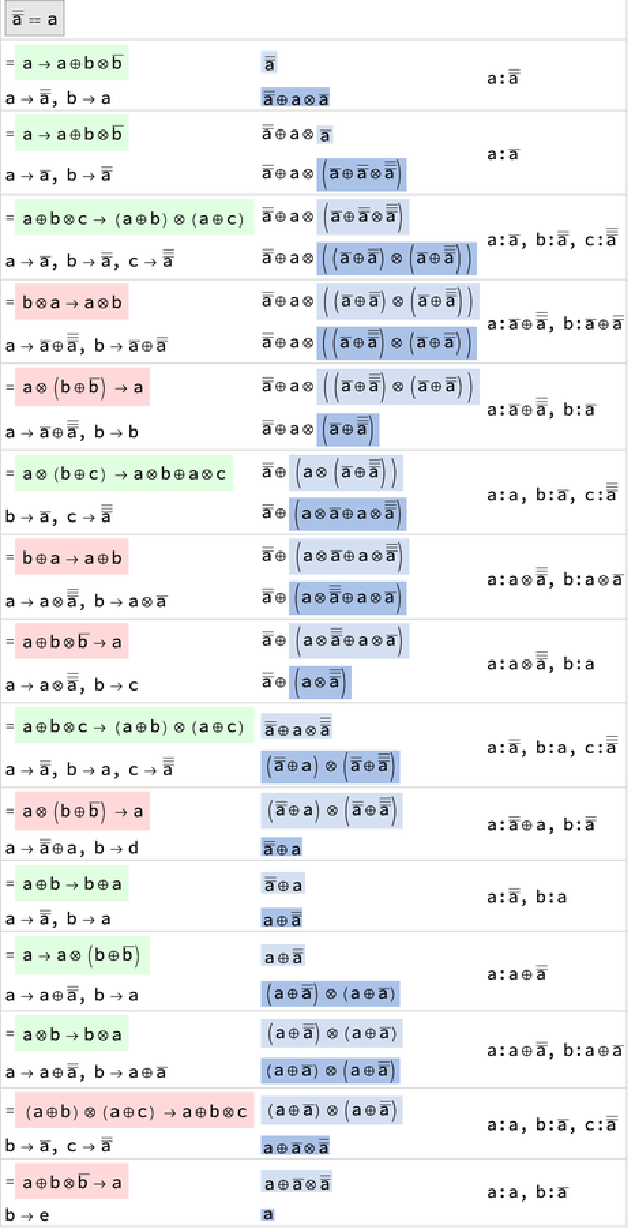 |
Wolfram Language 13.0 (December 2021) or above
This work is licensed under a Creative Commons Attribution 4.0 International License